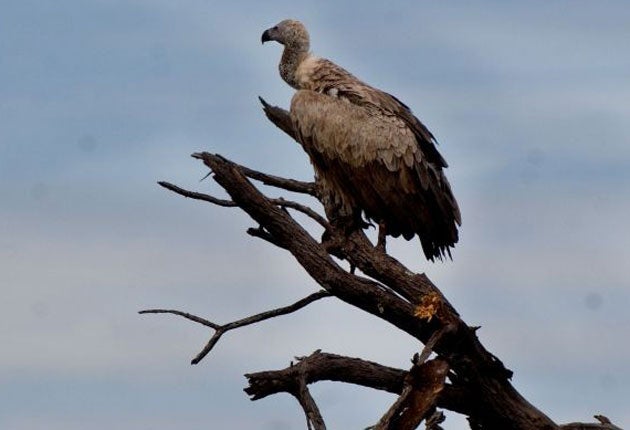Vulture 'Fab Four' get GPS in effort to save species

In the Disney version of The Jungle Book, four vultures vaguely resembling the Beatles bemoan to Mowgli that they are outcasts. They were, after all, members of a species known as Nature's Undertakers.
But thanks to global positioning system technology, another feathered foursome are about to win a new group of international followers.
The four white-backed vultures have been fitted with transmitters in a bid to discover more about the threats to the birds, which are dropping in numbers in Africa and Asia.
Named Angus, Alpha, Amur and Acacia, the birds were born in a vulture colony in the Northern Cape province of South Africa, and have been fitted with cellular transmitters, which send out their location once a day. Listed as "Near Threatened", African white-backed vultures in the wild are declining fast as they suffer from a series of threats including poisoning, where bait has been laid for other animals, changing land-use that leads to the loss of nesting sites, and collision with power lines. A growing threat is the harvesting of vultures for traditional cures.
The project is part of a long-term research programme being run by Britain's Hawk Conservancy Trust in partnership with BirdLife South Africa and the mining giant De Beers. Begun in 2000, it has involved fitting hundreds of vultures with identification leg rings and wing tags in an attempt to trace their movements.
"Although there is ring recovery and wing tag information that tells us how far vultures can travel, until we know where it is they are going and the distances they are covering, we don't know the threats and hazards they might be experiencing," said Campbell Murn, the Hawk Conservancy Trust's chief scientific officer.
"Until we know this, we can't start to form effective conservation plans to protect them. They might be travelling across the region, over country borders or possibly even the whole of the African subcontinent – we just don't know. This is why the new information we'll be securing is so important."
The vultures' travels can be followed online by clicking on to the new webpage at www.hawkconservancy.org
Subscribe to Independent Premium to bookmark this article
Want to bookmark your favourite articles and stories to read or reference later? Start your Independent Premium subscription today.

Join our commenting forum
Join thought-provoking conversations, follow other Independent readers and see their replies